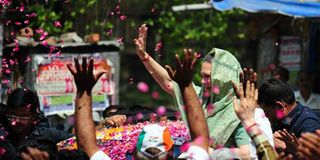How giant India has remained standing despite its democracy

PHOTO | AFP Indian Congress Party President Sonia Gandhi (right) gestures as she greets supporters before filing her nomination papers for the forthcoming general election at a district court in Rae Bareilly on April 2, 2014.
What you need to know:
- The statistics are stunning. There are 815 million eligible voters, which is the combined populations of the United States and the European Union. There are 543 constituencies being contested by 3,305 candidates.
- What’s more, the likely winner of the prime ministerial prize – Narendra Modi – is a supposedly celibate man who, nonetheless, could probably be standing trial for crimes against humanity at the ICC were he from a less powerful country.
The best argument for democracy is not how wonderful a system of government it is. The best argument I can think of is that giant India remains standing in spite of its democracy. As I write, the periodic spectacle of the country’s General Election – the most massive in the world – is taking place.
The statistics are stunning. There are 815 million eligible voters, which is the combined populations of the United States and the European Union. There are 543 constituencies being contested by 3,305 candidates.
By necessity, the election has to be staggered for five weeks, region by region. From past experience, the losers accept the result once the heated court petitions are done.
Still, India’s is not the angelic process you see on BBC or CNN. Far from it. According to the Association for Democratic Reforms (an Indian think tank), nearly a fifth of the declared parliamentary candidates are facing criminal charges, including for rape, murder and extortion.
Criminality has tended to be deeply embedded in Indian politics. In the previous parliament, almost a third of the members had pending criminal cases. Vote-buying and bribery are conducted on an industrial scale unknown anywhere else in the world.
What’s more, the likely winner of the prime ministerial prize – Narendra Modi – is a supposedly celibate man who, nonetheless, could probably be standing trial for crimes against humanity at the ICC were he from a less powerful country.
Three huge problems beset India. One is that of caste, an apartheid-style social stratification that has blighted Indian society for centuries. The second is corruption, which exists on a grand scale at all levels of government – national, state and local.
The third is religion, in the sense that it has caused more grief than harmony in the country. The reason Mr Modi remains so controversial is because of the way he has callously played the toxic Hindu-Muslim divide in the country.
In 2002, he was implicated in the infamous massacre of 2,000 Muslims in Gujarat where he is the chief minister. Though a Supreme Court-appointed investigation team absolved him on technical grounds)of direct complicity, his reputation for sectarian belligerence and enmity toward Muslims persists.
He has never even expressed remorse for the slaughter that happened on his watch. When asked about it, his response was totally gross. According to the Economist magazine, he said he regretted the suffering of Muslims the way he would the death of a puppy that was run over by a car.
Muslims are a minority in Hindu-majority India. But like everything in the vast country, their numbers belie their minority status. Nearly 11 per cent of the entire world’s 1.6 billion Muslims are Indian.
As a country, India has more Muslims (177 million) than any other except Indonesia and Pakistan. It would lead the world in its Muslim population if it had not been violently partitioned after independence in 1947 to create Pakistan.
Mr Modi belongs to the Bharatiya Janata Party (BJP), the Hindu nationalist coalition that is widely expected to win the election. With all his faults, he has made an economic success of Gujarat State, and voters look up to him to do the same across the country as prime minister.
BJP’s main rival is the ruling Congress party, the country’s oldest and most illustrious political organisation. Historically, it is secular and non-sectarian. Naturally, Muslims feel safer to shelter under Congress, as do Hindus who are uncomfortable with BJP’s Hindu nationalism and especially the muscular variety the likes of Mr Modi exemplify.
Unfortunately, Congress is going through lean times, and there is wide disillusionment with its rule. Its candidate for prime minister, Rahul, the heir to the celebrated Nehru-Gandhi dynasty, is not inspiring. He is colourless and speaks like a management consultant.
It is quite possible that BJP, if it wins, will be forced to rule in a broad coalition, as Congress is now doing with smaller parties. There is always a huge panoply of parties to choose from: caste-based parties, religious parties, regional parties, plus also the second largest remaining Communist party in the world (after China’s). Like Congress, the communists boast at being truly non-sectarian.
Kudos to Indian democracy.
[email protected] Twitter:@GitauWarigi





